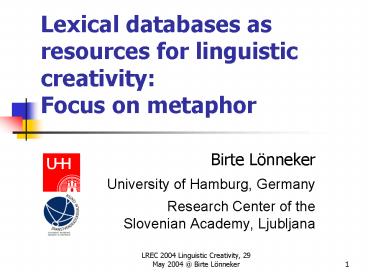Lexical databases as resources for linguistic creativity: Focus on metaphor - PowerPoint PPT Presentation
1 / 19
Title:
Lexical databases as resources for linguistic creativity: Focus on metaphor
Description:
Metaphor is a form of linguistic creativity: the more novel, the more creative ... {travel, go, move, locomote} {change magnitude} {descend, fall, go down, come down} ... – PowerPoint PPT presentation
Number of Views:22
Avg rating:3.0/5.0
Title: Lexical databases as resources for linguistic creativity: Focus on metaphor
1
Lexical databases as resources for linguistic
creativity Focus on metaphor
- Birte Lönneker
- University of Hamburg, Germany
- Research Center of the
- Slovenian Academy, Ljubljana
2
Introduction
- Metaphor is a form of linguistic creativity the
more novel, the more creative - There are several types of novel metaphors
- Novel metaphors are rare
- By studying conventionalized metaphors and their
novel extensions, we can learn more about
creative metaphors
3
A conceptual metaphor
- CHANGE IS MOTION
- Conventional lexical metaphors illustrate the
metaphorical mapping - The Financial Times 30-share index tumbled 34.9
to .... - ... profit margins fell to 3.9 from 5.8 a
year earlier, as general expenses soared nearly
sevenfold. - ..., service-industry employment rose about
200,000, against a 2.7 million drop in
goods-producing jobs.
Change abstract size
Change physical location
4
Systems for text understanding and generation
need knowledge resources
general expenses soared to soar1 SUBJ
airplane, flying object to soar2 SUBJ abstract
entity (with location on abstract scale)
5
Lexical databases as resources
- Questions
- To which extent do current lexical databases
provide information on conventional metaphor? - (... which is creatively extensible)
- Which representation structures
- do exist?
- are still needed?
6
Examples of lexical databases
- Princeton WordNet English, ongoing
- WN 2.0 115,000 concepts
- free!
- EuroWordNet eight European languages
- ca. 15,000 concepts for German
- ca. 23,000 concepts for French
- available from ELRA/ELDA
7
WordNet structuring principles
- Synsets are sets of synonyms or near-synonyms
referring to the same concept, e.g. - tumble, topple
- (the concept of falling down, as if
collapsing)
- Relations characterize the way in which two
synsets are connected, e.g. - tumble, topple
- HAS_HYPERONYM descend, fall, go down, come
down
8
ANTONYMY
MOTION
CHANGE
Lexical Metaphors in WordNet 2.0
travel, go, move, locomote
change magnitude
descend, fall, go down, come down
decrease, diminish, lessen, fall
decline, go down, wane
ANTONYMY
tumble, topple
drop
drop
tumble
rise, lift, arise, move up, go up, come up,
uprise
increase
wax, mount, climb, rise
soar, soar up, soar upwards, surge, zoom
...
soar
9
First consequences for knowledge-based systems
- Knowledge Acquisition
- Lexical databases as resource for representing
the structure of the source and target domain - Evaluation
- Reference to a common general lexical resource
can facilitate the comparison of different
systems that deal with metaphor.
10
The Hamburg Metaphor Database
- Currently, wordnets do not directly relate
conceptual domains that underly metaphoricity. - The mapping is reflected only indirectly by
parallel polysemy (if at all). - Aim of the Hamburg Metaphor Database
- Study how information on metaphors could better
be represented in Wordnets
11
Hamburg Metaphor Database Resources
- Corpora Collected for Master Theses
- Languages German and French
- Lexical database
- EuroWordNet in German and French
- Domain names Free list of conceptual domains and
mappings - (Lakoff et al. 1991)
12
Hamburg Metaphor Database Methodology
- Identify metaphorically used word in corpus texts
- Enter corpus context (sentence, phrase)
- Annotate the lexical metaphor with
- synset information from EuroWordNet
- domain information from metaphor list
- (additional) domain information in German
13
Hamburg Metaphor DatabaseExample
14
Case Study
- Input 22 results from the Hamburg Metaphor
Database for the source domain BUILDING (BAUWERK) - Target domains CREATING (ACTION), ORGANIZATION,
... - Lexical metaphors e.g. architect, construction,
debris, foundation, pillar
15
Representation of the BUILDING Source Domain in
EuroWordNet
destroy
create
creator
zerstören1
erschaffen1 erzeugen2 machen5 schaffen3
créateur1
INVOL- VED_ AGENT
zertrümmernN in Trümmer legenN
create
anfertigen1 fabrizieren1 fertigen1
herstellen3 ...
créer1 faire13
architect
INVOLVED_ RESULT
debris
Architekt1 ... architecte1 designer1 ...
TrümmerN
build
XPOS_NEAR_ SYNONYM
bauen2 fabriquer4 construire2 ...
créer13 réaliser3
AufbauN
CO_ AGENT_ RESULT
INVOLVED_ RESULT
bâtirN ériger1 élever8 ...
building
building part
foundation
Gebäude1 édifice1 ... construction6
Gebäudeteil1 élément de construction1
Fundament1 GrundfesteN
HAS_ MERO_ PART
FassadeN
SäuleN
socleN
16
More consequences for knowledge-based systems
- Much more relation types in EuroWordNet than in
Princeton WordNet - Therefore, domain-internal relations can be
denser - --
- Polysemy not represented in EuroWordNet for most
lexemes, we find only literal meanings - Some relation types not sufficiently instantiated
17
Mapping
- Relate central synset of source domain to
corresponding concept in target domain - directly in lexical resource (EWN)
- Target domain same structure as source domain
- Target domain lexical items have attested or
potential metaphorical meaning, - related to that of the central synset in the same
way as in the source domain.
18
destroy
create
creator
zerstören1
erschaffen1 erzeugen2 machen5 schaffen3
créateur1
INVOL- VED_ AGENT
zertrümmernN in Trümmer legenN
create
anfertigen1 fabrizieren1 fertigen1
herstellen3 ...
créer1 faire13
architect
INVOLVED_ RESULT
debris
Architekt1 ... architecte1 designer1 ...
TrümmerN
build
XPOS_NEAR_ SYNONYM
bauen2 fabriquer4 construire2 ...
créer13 réaliser3
The BUILDING Domain in EWN
AufbauN
CO_ AGENT_ RESULT
INVOLVED_ RESULT
bâtirN ériger1 élever8 ...
building
building part
foundation
Gebäude1 édifice1 ... construction6
Gebäudeteil1 élément de construction1
Fundament1 GrundfesteN
HAS_ MERO_ PART
FassadeN
SäuleN
socleN
N
19
Instead of a conclusion...
- Further topics
- Literal-figurative inconsistencies in current
lexical databases! - World knowledge (relations) in lexical resources?
- Your questions!?































